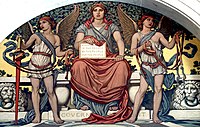
Photo from wikipedia
We study the link between tax competition, efficiency of available fiscal bases and public indebtedness levels in the member countries of a monetary union. Theoretically, labor taxation would be the… Click to show full abstract
We study the link between tax competition, efficiency of available fiscal bases and public indebtedness levels in the member countries of a monetary union. Theoretically, labor taxation would be the most efficient way to collect fiscal resources, as this production factor is more rigid; so, only initially weakly indebted countries can afford to have weak labor taxation rates. Empirical data also validate the decreasing relation between consumption taxation rates and public debt levels. On the contrary, capital taxation would be less efficient, because of capital mobility. If the capital taxation rate is higher than in the rest of the monetary union, tax evasion could deteriorate the fiscal base and increase the public debt to GDP ratio. So, empirical data show an ambiguous trend between the historical evolution of implicit capital taxation rates and public debt levels in the Euro Area.
Journal Title: Journal of Economic Integration
Year Published: 2020
Link to full text (if available)
Share on Social Media: Sign Up to like & get
recommendations!